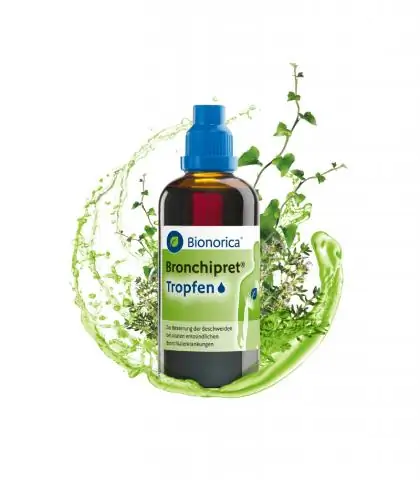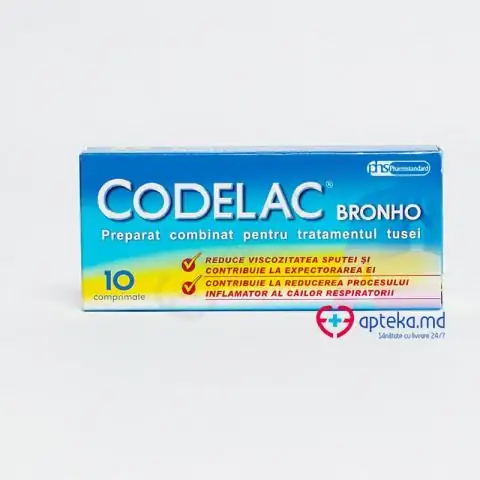- Author Rachel Wainwright [email protected].
- Public 2023-12-15 07:39.
- Last modified 2025-11-02 20:14.
Elisey
Elisey: instructions for use and reviews
- 1. Release form and composition
- 2. Pharmacological properties
- 3. Indications for use
- 4. Contraindications
- 5. Method of application and dosage
- 6. Side effects
- 7. Overdose
- 8. Special instructions
- 9. Application during pregnancy and lactation
- 10. Use in childhood
- 11. In case of impaired renal function
- 12. Drug interactions
- 13. Analogs
- 14. Terms and conditions of storage
- 15. Terms of dispensing from pharmacies
- 16. Reviews
- 17. Price in pharmacies
Latin name: Elizey
ATX code: R06AX27
Active ingredient: desloratadine (Desloratadine)
Manufacturer: Farmak (Ukraine)
Description and photo updated: 2020-14-04
Prices in pharmacies: from 174 rubles.
Buy

Elisey - antiallergic drug, blocker of histamine H 1 receptors; possesses antiexudative, antipruritic and decongestant effect.
Release form and composition
Dosage forms of Eliza:
- syrup: orange liquid with a transparent viscous structure (60 or 100 ml each in brown glass bottles, in a cardboard box 1 bottle complete with a dosing spoon, a dosing glass);
- film-coated tablets: blue, round, biconvex, core - from almost white to cream color (10 or 30 pcs. in blisters, in a cardboard box 1 blister).
Each pack also contains instructions for the use of Eliza.
1 ml of syrup contains:
- active substance: desloratadine - 0.5 mg;
- auxiliary components: sucrose, sorbitol (E420), sodium hydrogen phosphate dodecahydrate, propylene glycol, citric acid monohydrate, disodium edetate dihydrate, sodium benzoate (E211), sunset yellow dye (E110), purified water.
1 tablet contains:
- active substance: desloratadine (in terms of anhydrous 100% substance) - 5 mg;
- auxiliary components: corn starch, calcium hydrogen phosphate dihydrate, lactose monohydrate, microcrystalline cellulose 101 and 102, hypromellose, magnesium stearate;
- film sheath: Opadry II 85F 30571 Blue [polyvinyl alcohol, polyethylene glycol, indigo carmine (E132), iron oxide red (E172), titanium dioxide (E171), talc].
Pharmacological properties
Pharmacodynamics
Elisey is an anti-allergic drug that has antipruritic, decongestant, anti-exudative action. It not only facilitates the course of allergic reactions, but also prevents their development. Reduces capillary permeability, prevents the development of tissue edema and smooth muscle spasm. The active substance of Eliza - desloratadine, is a histamine H 1 blocker- long-acting receptors, the primary active metabolite of loratadine. The mechanism of action of desloratadine is due to its ability to inhibit the cascade of reactions of allergic inflammation, including the adhesion and chemotaxis of eosinophils, the production of superoxide anions by activated polymorphonuclear neutrophils, the release of interleukins IL-4, IL-6, IL-8, IL-13 and other pro-inflammatory cytokines. (P-selectin, IgE-mediated histamine release, prostaglandins D2, leukotrienes C4), release of pro-inflammatory chemokines (RANTES).
Elisey does not affect the central nervous system, has practically no effect on the speed of psychomotor reactions, does not have a sedative effect. Does not cause lengthening of the QT interval on the ECG (electrocardiogram).
The results of clinical laboratory studies confirm the safety of using the drug in the form of a syrup in children aged 6 months to 11 years in need of antihistamine therapy. Treatment was well tolerated with desloratadine at a daily dose of 1 mg for children aged 6-11 months, 1.25 mg for children aged 1-5 years and 2.5 mg for children aged 6-11 years. Violations of the state of vital functions of the body were not observed.
After oral administration, Elisey begins to act within half an hour, the therapeutic effect lasts throughout the day.
Pharmacokinetics
After oral administration, desloratadine is well absorbed and determined in blood plasma after half an hour. The maximum concentration (C max) in the blood is reached on average within 3 hours. The bioavailability of desloratadine is dose proportional, ranging from 5 to 20 mg. Simultaneous food intake (including a high-fat breakfast and grapefruit juice) does not affect the distribution of desloratadine.
Plasma protein binding - 83-87%.
Does not cross the blood-brain barrier, passes into breast milk.
When using therapeutic doses, cumulation of the drug is not observed.
It is intensively metabolized in the liver by hydroxylation to form 3-OH-desloratadine, combined with glucuronide. Desloratadine has no inhibitory effect on the CYP3A4 and CYP2D4 enzymes, is not an inhibitor or substrate of P-glycoprotein.
The half-life is 20-30 hours. It is excreted through the kidneys (less than 2%) and intestines (less than 7%).
It was found that when using desloratadine in the form of a syrup in the recommended doses in pediatric practice, the AUC (area under the concentration-time pharmacokinetic curve) and C max in children and adults who took a syrup at a dose of 5 mg are comparable.
Indications for use
The use of Eliza is indicated for the elimination of symptoms associated with conditions such as:
- allergic rhinitis (nasal discharge, sneezing, itching in the palate, cough, itching and nasal congestion, watery eyes, itching and redness of the eyes);
- hives (rash, itching).
Contraindications
Absolute:
- syndrome of glucose-galactose malabsorption, lactase deficiency and / or lactose intolerance;
- fructose intolerance (for syrup);
- period of pregnancy;
- breast-feeding;
- hypersensitivity to the components of Elisey.
Age contraindications:
- syrup: less than 6 months old;
- tablets: under 12 years of age.
Elisey syrup and tablets should be taken with caution in severe renal failure.
Elisey, instructions for use: method and dosage
Syrup
Elisey syrup is taken orally with a sufficient amount of water.
The drug is used regardless of food intake, once a day using a dosing spoon or dosing glass.
The recommended dosage of Eliza has the following age restrictions:
- Infants 6 months to 1 year: 2 ml (1 mg);
- children 1 to 5 years old: 2.5 ml (1.25 mg);
- children from 6 to 11 years old: 5 ml (2.5 mg);
- patients over 12 years of age: 10 ml (5 mg).
The duration of the course of treatment depends on the severity of the course of the disease.
With intermittent allergic rhinitis (the presence of symptoms for less than 28 days or less than 4 days within 7 days), syrup should be taken in case of symptoms and stopped after they disappear.
For persistent allergic rhinitis (symptoms for more than 28 days or more than 4 days within 7 days), treatment should be continued for the entire period of exposure to the allergen.
Film-coated tablets
Elisey tablets are taken orally, regardless of food intake, swallowing whole (without chewing) and drinking a little water.
The drug must always be used at one (convenient for the patient) time of day.
Recommended dosage for adults and children over 12 years old: 1 pc. (With 5 mg) once a day.
The duration of treatment depends on the severity of the disease.
With intermittent allergic rhinitis, pills should be discontinued after symptoms disappear and resumed when they reappear.
With persistent allergic rhinitis, Elisey is taken throughout the entire period of contact with the allergen.
Side effects
The results of clinical and post-marketing studies indicate that desloratadine is well tolerated. The most common side effects include dryness of the oral mucosa, fatigue and headache.
Possible adverse reactions when using Elisey:
- from the nervous system: insomnia, headache, psychomotor hyperactivity, dizziness, drowsiness, convulsions;
- mental disorders: hallucinations;
- from the heart: palpitations, tachycardia; with an unknown frequency (in children against the background of syrup use) - lengthening of the QT interval, bradycardia, arrhythmia;
- from the gastrointestinal tract: dryness of the oral mucosa, abdominal pain, diarrhea, dyspepsia, nausea, vomiting;
- from the hepatobiliary system: an increase in the concentration of bilirubin, an increase in the activity of liver enzymes, hepatitis;
- from the immune system: hypersensitivity reactions (including itching, shortness of breath, rashes, urticaria, angioedema, anaphylaxis);
- from the musculoskeletal system and connective tissue: myalgia;
- general disorders: increased fatigue.
If undesirable effects appear or worsen, it is recommended to consult a doctor.
Overdose
Symptoms: Drowsiness may appear.
Treatment: immediate gastric lavage, intake of activated charcoal. Shows careful monitoring of the patient's condition and the appointment, if necessary, of symptomatic therapy. Hemodialysis is ineffective, and there are no recommendations for using peritoneal dialysis to remove desloratadine.
special instructions
The syrup contains sorbitol, therefore Elisey is contraindicated in patients with congenital fructose intolerance.
With the simultaneous use of Eliza and alcoholic beverages, an increase in the effects of ethanol, such as drowsiness or impaired psychomotor function, is not observed.
Influence on the ability to drive vehicles and complex mechanisms
Due to the fact that desloratadine in rare cases causes the development of such negative phenomena on the part of the nervous system as drowsiness and dizziness, during the period of taking Eliza, patients should be careful when driving vehicles and complex equipment.
Application during pregnancy and lactation
The use of Eliza is contraindicated during pregnancy and lactation.
Pediatric use
Elisey syrup is not prescribed for children under 6 months old, tablets - under 12 years old, since the effectiveness and safety of the drug in these cases has not been established.
With impaired renal function
With caution, only on the recommendation and under the supervision of a physician, Eliza should be taken in patients with severe renal insufficiency.
Drug interactions
- ketoconazole, erythromycin, fluoxetine, cimetidine, azithromycin: concomitant therapy with each of these agents does not have a clinically significant effect on the level of desloratadine plasma concentration;
- other drugs: interactions when combining desloratadine with other drugs cannot be completely ruled out, therefore, care should be taken if it is necessary to take it together;
- ethanol: Desloratadine does not exacerbate the negative effects of alcohol or ethanol-containing oral medications on psychomotor function.
Analogs
Elisey's analogs are Desloratadin, Desloratadin Velpharm, Desloratadin Canon, Desloratadin-VERTEX, Desloratadin-Teva, Alestamine, Blogir-3, Desal, Delorsin, Lordestin, Nalorius, Ezlor, Erius, Eslontin, etc.
Terms and conditions of storage
Keep out of the reach of children.
Store at temperature: syrup - up to 30 ° C, tablets - up to 25 ° C in a dark place.
Shelf life: syrup - 2 years, tablets - 3 years.
Terms of dispensing from pharmacies
Available without a prescription.
Reviews about Elisee
Reviews about Elisea are positive. Patients indicate the effectiveness and rapid action of the drug in relieving symptoms of seasonal allergic rhinitis.
Price for Elisey in pharmacies
The price of Eliza for a pack containing 30 tablets can be about 295 rubles, 10 tablets - 141-175 rubles.
Elisey: prices in online pharmacies
|
Drug name Price Pharmacy |
|
Elisey 5 mg film-coated tablets 10 pcs. 174 r Buy |
|
Elisey 5 mg film-coated tablets 30 pcs. 305 RUB Buy |
|
Elisey tablets p.p. 5mg 30 pcs. 322 r Buy |

Maria Kulkes Medical journalist About the author
Education: First Moscow State Medical University named after I. M. Sechenov, specialty "General Medicine".
Information about the drug is generalized, provided for informational purposes only and does not replace the official instructions. Self-medication is hazardous to health!






